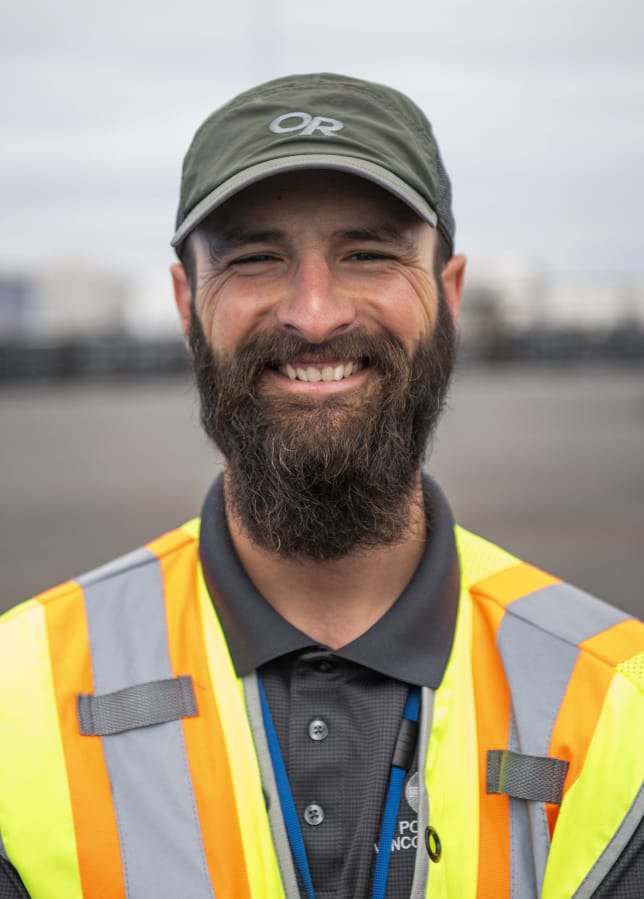Environmental specialist Phillip Martello sometimes can be found wandering down abandoned back roads and into the weeds.
On a recent weekday, equipped with a small Canon Powershot camera, he strolled down one such road along the Columbia River near Frenchman’s Bar Regional Park. The 2-acre parcel, not far from the port’s main offices, was previously owned by the Port of Vancouver and identified as a mitigation site; it had endured some impact to its shoreline from a trench section dug by the port for its West Vancouver Freight Access project, which was completed last year.
As a Port of Vancouver employee, Martello’s job is to monitor environmental activity at their mitigation sites, which include 170 acres covering eight sites, according to Ryan Hart, the port’s chief external affairs officer.
“We put in this one section that we referred to as a trench, and the trench impacted some shoreline,” Martello said. Signs along the decommissioned road read “Riparian mitigation area. Please retain in a natural state.”
“I think trees are the easiest to understand. If we cut down trees for a construction project, we’d have to plant two elsewhere. Since we were taking riparian, which is just trees along shoreline, we had to mitigate elsewhere,” Martello said. At that site, he said they planted a variety of trees, including 200 black cottonwoods, 50 Oregon ash, and others.
Down the embankment from the road were several bat boxes installed on the sides of snags — large, still-standing dead trees — which give birds and other animals a place to perch or nest.
“We have a requirement through the city that we check up on this annually for five years,” Martello said. “I’m just checking on the condition of the bat boxes to see if there are droppings beneath it or anything is living on the snags. Then I’m also looking for all the black cottonwood that we planted to make sure there are no dead ones. Then some volunteers just sprout up. We can count those as part of our mitigation.”
Stormwater permitting
Martello, 37, is a New York native. He graduated from Slippery Rock University in Pennsylvania in 2011, where he studied environmental geosciences, and got a job at Arizona’s Department of Environmental Quality, he said.
“It was 100 percent office work. I was a paper-pusher; I was not happy,” Martello said. But while there, he stumbled into somewhat of a niche interest in stormwater permitting.
Now, he’s working in a department of five at the Port of Vancouver, spending 60 percent of his workweek in the field and 40 percent in the office.
“I think they were particularly interested in me because I was a stormwater permit writer for the DEQ and the port had three different stormwater permits,” Martello said.
Monitoring stormwater runoff is a significant task. According to a report by the Environmental Protection Agency, urban runoff was the leading source of pollutants causing water quality impairment related to human activities in ocean shoreline waters, and the second-leading cause in estuaries across the nation.
Martello will take water samples within 12 hours after it rains, as preferred by the Department of Ecology, he said. He sends the samples to a lab to determine levels of metals such as zinc and copper. At the port’s Terminal 2 biofiltration pond, Martello has been working toward meeting the benchmark for copper. According to the Department of Ecology, in the last year, the port has had five violations, or permit triggers, four of which were “benchmark exceedance” violations, and one reporting violation.
“It’s a requirement by the Department of Ecology to do what’s called a corrective action. It’s a three-strike system,” Martello said. “Since I’ve been here we reached a level three over at Terminal 4 and we did some improvements to the design of the pond. Even with all those improvements, there’s still more work to be done.”
As he walked down the path, he pointed out signs of wildlife — possible droppings, and tufts of bird feathers surrounding a snag.
“I’m not sure if it’s bat droppings, but I’m going to take a picture of it,” he said. The photos are sent to the U.S. Army Corps of Engineers, the city, and the National Marine Fisheries Service, he said.
Following regulations
Regulations are always changing, which affects Martello’s job, he said.
“Every five years they rewrite the stormwater permits. Sometimes they move the benchmarks around, sometimes there’s more requirements. So you’re always adapting and always following what the new regulations are going to be doing,” he said.
When asked if the federal government had any impact on his job, Martello said he feels President Donald Trump “seems to be a little more interested in (the National Environmental Policy Act)” and the Endangered Species Act.
In May, Reuters reported that Trump would be making adjustments to NEPA — which requires comprehensive environmental impact studies to be completed before large-scale projects — in order speed up permitting. Earlier this month, he also moved to weakened how the government applies the Endangered Species Act.
WORKING IN CLARK COUNTY
Working in Clark County, a brief profile of interesting Clark County business owners or a worker in the public, private, or nonprofit sector. Send ideas to Hope Martinez:
hope.martinez@columbian.com; fax 360-735-4598; phone 360-735-4550.
As he strolled along, Martello pointed to the gray skies as indication that it was going to rain soon, which means he’ll have an opportunity to take a fresh stormwater sample.
“It’s interesting. People always think of environmental regulations as job-killers. But I’ve been working with environmental regulations and know so many other people who work with environmental regulations, and if it weren’t for environmental regulations I wouldn’t even have a job,” Martello said.




